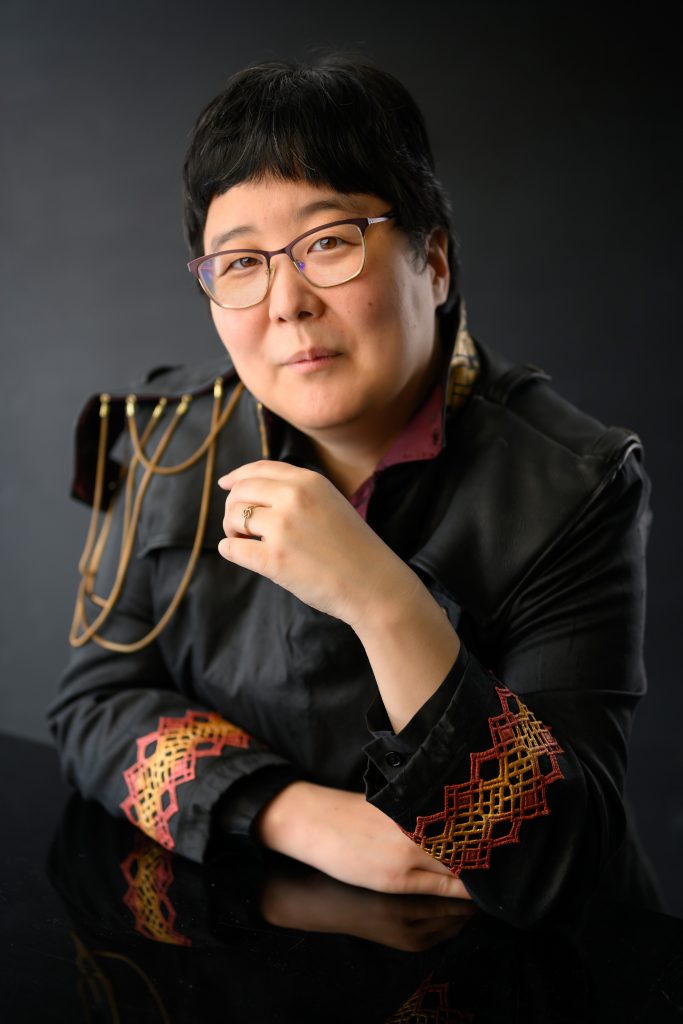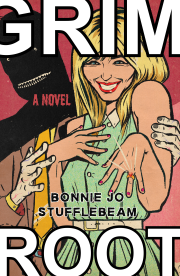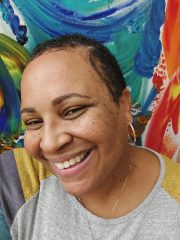Dance the Exotic Dance for Me!
by Yoon Ha Lee
When I was a kid in the 1980s and 1990s, I adored classical mythology, Arthurian mythology, the Cthulhu mythos. I was the weirdo who holed up in the library reading Tacitus, Plato, and Sylvia Plath for fun. I had ambitions of writing science fiction and fantasy.
Yet the science fiction and fantasy I’d grown up reading, the games I grew up playing, never featured people like me—Korean-American by way of Texas—or the Korean foods I grew up eating. I would have murdered to see one single consarned character eat space gimchi instead of space steak and space potatoes. Years later, when I walked into Gencon and saw an enormous wall banner with an Asian-inspired game character named Yoon (Pathfinder), I almost cried. It was the first time I’d seen a fantasy setting that had a character with my name.
My early stories reflected this constricted sense of possibility. My characters gallivanted around fantasy settings inspired by fake medieval Europe. They were white, and not just in the “needs to invent suntan lotion” sense. They had names that were fake French or fake German or, if I felt fancy, fake Latin. I would have been a shoo-in to write for Warhammer 40,000 if I had heard of it at that age and if Games Workshop hired twelve-year-olds with delusions of big space battles.
It wasn’t until later that I realized I could draw on the Korean folklore I had learned from my parents, incorporate the music, art, and landscapes from my childhood in Seoul, or write about characters like myself—and get published. From short stories that were wall-to-wall fake French/German names and implicitly white characters, I started broadening my range. My debut adult novel and first middle grade book, both featuring space Asians, drew to a lesser (Ninefox Gambit) or greater (Dragon Pearl) extent on those cultural experiences.
Novels like to present us with tidy resolutions and happy endings. (See also: every “we overthrew the evil empire” narrative where it’s implied that everything is fixed forever and the hard work is over, when historical evidence suggests strongly that the hard work is beginning.) Real life is rarely that obliging.
The happy ending we writers often get sold is, “Great! You get to write about Asians (or whoever) in space and have a writing career!” By SF/F writer standards, I am doing well with my stories of space Asians and big space battles. Ninefox Gambit was nominated for the Hugo, Nebula, and Clarke awards, and won the Locus Award for Best First Novel. Dragon Pearl was a New York Times bestseller. I paid off my student loans. I can afford a watercolor habit.
The happy ending is a fucking lie.
The happy ending is a cage. A white-ass writer can write retellings of classical mythology and it is unremarkable. How many people hassle Madeline Miller about Greek heritage? When I write a retelling of the “Judgment of Paris,” I get pushback because it’s not a Korean story; how dare I step outside “my” lane? At the same time, people assume personal background levels of authenticity from that Korean-religion-factoid I put in a story after reading it six months ago on Wikipedia. Certain readers want me to provide exciting cultural voyeurism, and educate them in a fun, exotic bingo-square experience for their Goodreads challenge, and make them feel good about how performatively progressive they are; how dare I step outside the cage and refuse to perform the way they require me to?
My education was English-language, USA/Western (Department of Defense schools, public schools, International Baccalaureate). My literary heritage comes from that. Works I have read/encountered and which are part of my internal dreamscape of myth and literature include “The Dream of the Rood,” the Iliad and Odyssey, The Faerie Queene, Chanson de Roland, Beowulf, The Book of the City of Ladies, Alice’s Adventures in Wonderland, various Child ballads; the list could go on.
I have read The Art of War, but I have never read the Samguk Yusa or the stories of Hong Gildong. I have never read Journey to the West, or The Dream of the Red Chamber, or any of the sutras. Yet if I write something “Asian,” it’s automatically assumed to be authentic.
Earlier in my career, editor Sean Wallace asked me to contribute to an anthology, and I was too cowardly to say no to the opportunity. The anthology was Japanese Dreams. I suppose East Asians are all interchangeable. For that matter, there are non-Asian writers who are fluent in Japanese and have studied the culture and history who would have been better qualified. My primary exposure to Japanese culture and history at that time was via AEG’s samurai fantasy-themed card game/roleplaying game, Legend of the Five Rings. I love L5R, but I do not know one single solitary person who could, with a straight face, argue that it was “authentic” in any sense of the word. This is like saying AD&D (Advanced Dungeons & Dragons) 2nd ed.’s Arms and Equipment Guide is a useful primary source on medieval European weapons and armor.
My novel Ninefox Gambit takes place in a despotic, expansionist government whose technomagic runs on human sacrifice and weaponized thought control. I’m cynically amused every time I see comments that it’s obviously referencing North Korea or China. No one ever seems to think that European imperialism or the USA’s McCarthyism could have been inspirations here. Why not both?
Likewise, people assume the antecedents for the science fantasy elements, in which the laws of physics can be warped by mass ritual and brainwashing, must be wuxia or anime. No one looks at USA superhero comics or role-playing game settings such as AD&D’s Planescape or White Wolf’s Mage: The Ascension, both of which feature realities created by consensus. People assume that General Shuos Jedao, the setting’s most brilliant tactician before he turned traitor and murdered two armies, one of his own, is a dark reflection of the Joseon Dynasty’s Admiral Yi Sun-Shin. I am still waiting for someone to pick up on the fact that the primary thematic inspiration for Jedao is the fallen angel Lucifer/Satan. (I used to be a Christian and attended a Christian international high school.)
I’m genuinely thrilled that a wider range of stories, with a wider range of characters, is available to my half-Korean daughter, and to readers generally, than what I had available as a kid. Kate Elliott’s Unconquerable Sun reimagines Alexander the Great not just in space, but as a queer woman. The heroine of A.D. Sui’s The Dragonfly Gambit plots against the fleet she belonged to before she sustained a disabling injury. Rivers Solomon’s An Unkindness of Stars examines a dark future aboard a generation ship through the eyes of a Black neurodiverse protagonist. The protagonist of Max Gladstone’s Full Fathom Five is a trans woman who builds gods to order. Becky Chambers’ A Psalm for the Wild-Built envisions a tranquil future through the eyes of a nonbinary tea monk. There’s been an explosion of stories drawing on non-European cultures and histories: Roshani Chokshi’s The Spirit Glass, Rebecca Roanhorse’s Black Sun, Tade Thompson’s Rosewater; the list could go on.
At the same time, I’m troubled by “authenticity” when it’s weaponized selectively as a cage, used to gatekeep “acceptable” stories and topics for some authors and not others. There’s a reason Jedao is space Asian, but he’s a space Asian with a Texas drawl, as opposed to whatever the hell people think men of Asian heritage “must” look like or sound like according to some K-drama. I’m troubled when certain experiences or stories aren’t considered “real,” or more relevantly from a career standpoint, marketable, because they don’t fit into the confused preconceptions of some fucking cultural voyeur or some demographic calculation.
I’ll close with one final anecdote. I was recently contracted for a work-for-hire story for an unspecified Asian market. (I had to bow out partway through when my health crashed.) When I onboarded with the editor who had pulled my name out of a hat, they remarked, quite candidly, that they had never read a single thing I had ever written, but (a) they were looking for a bestselling author (b) of Asian heritage. I wasn’t offended as such, given the staggeringly high pay rate, but “you’re a warm body of the right ethnicity” is not a shining encomium designed to gladden a writer’s heart, either.
I often wonder if that’s all that publishing has left to offer me: getting gigs as a walking bingo square. At a certain point, I’m going to get tired of whoring out for the money and find something else to do.
By all means, continue writing and publishing stories grounded in authors’ experiences—largely cultural in my case, but there are other inflections (disability, queerness, asexuality, neurodivergence, religion, socioeconomic status, the list goes on). But don’t make it a fucking cage.
 Yoon Ha Lee’s first novel Ninefox Gambit won the Locus Award for best first novel, and was a finalist for the Hugo, Nebula, and Clarke awards. His middle grade novel Dragon Pearl won the Mythopoeic Award for Children’s Literature and the Locus Award for best YA novel. He lives in Louisiana with his husband and an extremely lazy catten.
Yoon Ha Lee’s first novel Ninefox Gambit won the Locus Award for best first novel, and was a finalist for the Hugo, Nebula, and Clarke awards. His middle grade novel Dragon Pearl won the Mythopoeic Award for Children’s Literature and the Locus Award for best YA novel. He lives in Louisiana with his husband and an extremely lazy catten.
This is the seventh essay in the Publishing Taught Me: A SFWA Anthology Project. The Publishing Taught Me project is overseen by multiple award-winning editor Nisi Shawl and two editorial interns, Somto Ihezue and Zhui Ning Chang. More information on this series can be found here: Publishing Taught Me: A SFWA Anthology Project – SFWA


